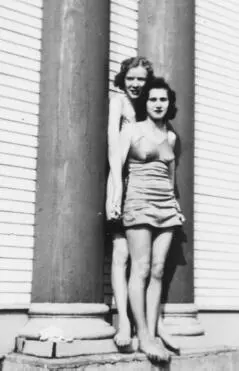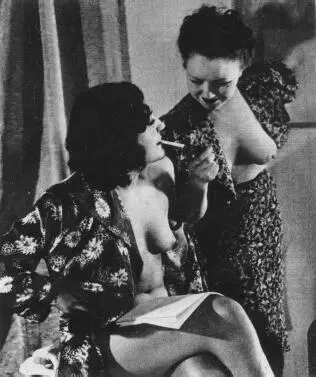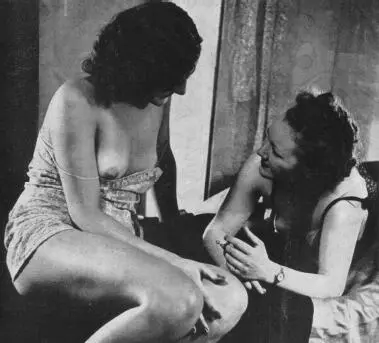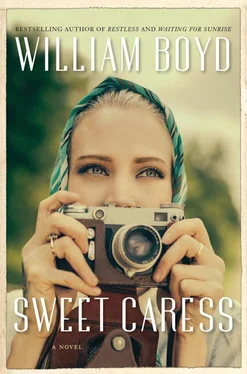‘Oh. Hello, Mr Finzi.’
‘I read about your trial in The Times. Commiserations.’
‘Thank you. But it was hardly a trial. I pleaded guilty.’
‘That was the right thing to do. But, you know, I think you should look on it as a sign.’
‘A sign of what?’ I reached for a box of cigarettes, opened it, selected one of the two cigarettes remaining and lit it. I was enjoying hearing Cleveland Finzi’s calm American accent — he sounded even more sure of himself, if such a thing were possible.
‘A sign of my stupidity?’ I asked, exhaling.
‘It’s a sign that you had done something significant. Your photographs shocked people. They had an effect. How often can any photographer say that in today’s modern world?’
‘I’ll try to console myself with that thought.’
‘What’re you going to do now, Miss Clay?’
‘You mean before I commit suicide?’
‘There’s no hurry. You can do that any time. Ever been to New York?’
‘No.’
‘Would you like to go?’
‘One day, perhaps. Yes.’
‘Before you commit suicide.’
‘Obviously. Ha-ha.’
There was a silence, then he said: ‘What if I offer you a job? Would that lure you over?’
I felt that heart-lurch, throat-closure. I drew deep on my cigarette.
‘Well. . Maybe,’ I said, carefully, sensing implications, expectations — a future — suddenly crowding round me.
‘Two hundred a month. What do you say?’
‘Two hundred what?’
‘Dollars.’





Images from Berlin bei Nacht (now lost). Girls from the Xanadu-Club, Berlin, 1931.
THE BARRANDALE JOURNAL 1977
Today is Xan’s birthday. He would have been sixty-one. Poor Xan. I searched for his book of poems and found it and read the poem he’d dedicated to me. It made me cry and I hate crying, now.
The Anti-cliché (for Amory)
We were
tropical
opposites,
Capricorn and
Cancer,
diametrically aligned.
But
life is a
vertiginous
elevated railroad.
Timor mortis
has us both
in its
pincer-like
grip.
We cling on
for dear
existence,
fearful of the
undignified isolation
of death,
the long
hello.
1 JANUARY 1934. I woke very early, for some reason, as if I wanted to kick-start the beginning of this particular year, set it off and running with due energy as soon as possible. I slipped out of bed and dressed. The morning light was dull and tarnished — that hint of jaundice in the air that presages snow. I pulled on my heavy tweed coat and stepped out. My apartment — ground floor at the rear — was on Washington Square South in Greenwich Village. Consisting of a long corridor that linked sitting room, kitchen, bathroom and bedroom, the place was dark, apart from the bedroom that overlooked a small yard containing a tall slim ailanthus tree — all for $15 a month.
I headed over to ‘365’ on West 8th Street to buy cigarettes. ‘365’ was not the number of the store’s address but a signal that it opened every day, even on New Year’s Day. When I arrived there, Achilles, the owner, was sliding back the concertina grille on the street door. Across the road a Chinese boy was sweeping the steps of a chop-suey house. The Village was stirring, the year was under way.
Achilles was a stocky, bow-legged man with a permanent white corpse-stubble on his chin and jaw.
‘A happy new year, Miss Amory,’ he said, leading me into the store, effectively a wide long corridor off the street, shelved on both sides with a counter at the end. Flypaper spiralled from the moulded tin ceiling. There was a sign above the counter that said ‘We sell everything apart from liquor’.
I asked for a pack of Pall Malls for me — a little gesture to London in New York — and a pack of Camels for Cleveland. As I was Achilles’ first customer of 1934 I decided to be a good augury and bought some more items at random: a box of Rinso, some Wheat Krumbles and a bag of cinnamon buns.
‘And I’ll take some Alka-Seltzer,’ I said.
‘Partying last night?’
‘No, no. Early to bed. I’ve got a friend coming round for some lunch.’
‘A friend who smokes Camels, I’m guessing. A true hostess. I know you likes the Pall Malls, Miss Amory.’
We chatted on. I took strange pleasure in being known in my neighbourhood, as if I was settled here for a while, as if it gave my life a semblance of normality — that being here in this city was something I had planned, not simply something that had happened to me.
‘Let’s hope ’34 is better than ’33,’ Achilles said, as he bagged my groceries.
‘At least you can have a drink without getting arrested,’ I said. We laughed. In the last three weeks six liquor stores had opened within a two-block radius of Washington Square. America’s drinking was out in the open again.
‘Yeah, ain’t that something new,’ Achilles said, nodding, ‘though I have to say I kinda miss the speakeasies.’
I wandered home with my groceries and sat in my apartment with the wireless on, listening to jazz, reading a book — God’s Little Acre by Erskine Caldwell — while I waited. I had painted the walls in the sitting room a pale ivory to maximise the light that came in through the small solitary window. I had hung some of my photographs here and there and had smartened up the rented sofa and two armchairs with quilted throws I’d bought in a junk shop on Bleecker. The tiled corridor led on past the tiny kitchen and bathroom to the back bedroom that gave on to the yard with its stark spindly tree. The room had a big, twelve-paned sash window and at midday in the summer when the sun shone directly down it was so blazingly luminous you felt you were in the tropics, not Manhattan.
Cleve was running late, clearly, so at 1.30 I made myself a gin and Italian and toasted in the new year, recognising as I did so that I’d been in New York for nearly eighteen months, now — though I still felt a transient, passing through, and that this apartment, this address, my job and my salary were very temporary aspects of my autobiography and whatever significance this sojourn would have in any retrospective view was impossible to discern. Why was I thinking in this mean-spirited, uncharitable way, I asked myself? I was so much better off here than in London, in every sense: solvent, housed, gainfully employed, my notoriety unheard-of. But I was unsettled in some way, I knew, and I knew it was all to do with the love affair—
On cue Cleveland Finzi pressed the buzzer at the main door and I let him in.
We kissed, gently, held each other and wished ourselves a happy 1934.
‘Do you want to eat?’ I asked. ‘Or. .?’
‘I’d like some “or”, please.’
I smiled, turned and walked through to the bedroom, unbuttoning my blouse, hearing the metalled half-moons on the heels of Cleve’s loafers clicking sharply, confidently, on the terracotta tiles of the corridor behind me.
Читать дальше

















